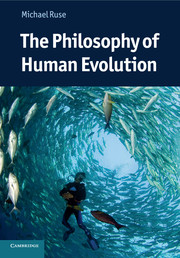4 - Progress
Published online by Cambridge University Press: 05 June 2012
Summary
It is a huge job to understand humans from an evolutionary perspective, if indeed that is in any way possible. Especially since, even if you wanted to, for practical as well as ethical reasons, you cannot really experiment on us. But there is more to the matter than just the science, or rather just the straight science. There is the fact that we are humans. The conclusions matter in a very personal way. For Christians and indeed for members of other major faiths (especially Judaism and Islam) it is virtually a priori obvious that what evolution has to say about humankind is going to be interesting, and perhaps threatening. It is central to Christianity that we humans are special, we are particularly favored by God because we alone are “made in His image.” What this means precisely is a matter of some debate. Most Christians are not biblical literalists, thinking that God created humans some 6,000 years ago, on the sixth day, out of mud or some such thing. They may not even think that we have to be exactly as we are. Perhaps for instance humans might have six fingers or green skin. I am not sure about sex, but perhaps even this is an option. It has always been fundamental to the Judeo-Christian perspective that God is not a sexual being, even though traditionally we refer to God as “Father” and as “He.” But, as St. Augustine pointed out around the end of the fourth century, we do have to be intelligent beings and creatures with a moral capacity. Without that, nothing makes sense. More than this, our existence has to be necessary in some sense. It cannot just be a matter of chance that humans or human-like creatures exist. I don’t see any reason why we shouldn’t exist on the moon or somewhere else if that is a viable option. (Obviously as things stand the moon is not a viable option.) But exist we must (Plantinga 2009).
Non-believers obviously don’t have this kind of motivation to make humans special and essential, as we might say. Yet a surprisingly large number do share the sentiments to some extent. A large factor in the opposition to evolutionary psychology and related activities is more theological (or, if you like, philosophical) than the raw facts of the case would lead you to expect. People really just don’t like the idea that we are simply part of the animal world, no more, no less. (See Fodor and Piattelli-Palmarini 2010, for example.) Somehow this is seen as challenging to our status, and something that downgrades us unjustifiably. This sentiment is perhaps understandable from those who are Marxists, for not only is this (via Hegel) a belief-system with deeper roots in Christianity than its adherents are often prepared to recognize, but explicitly it singles out human beings as entities uniquely in the realm of culture, tool use, and so forth. But the feeling is broader than that. The twentieth-century American paleontologist George Gaylord Simpson (1949) spoke for many when he said: “If animals are so important, why don’t they just say so?”
- Type
- Chapter
- Information
- The Philosophy of Human Evolution , pp. 99 - 127Publisher: Cambridge University PressPrint publication year: 2012

